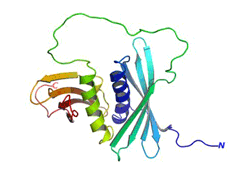
| 货 号 | GA-PR0007HU |
| 种 属 | Human |
| 规 格 | 0.1 mg/0.2mg |
| 品 牌 | GenAsia |
| 产 地 | Shanghai China |
| 单 价 | US$350/US$620 |
详细信息
1,宿主 Host: Escherichia coli (E. coli)
2,种类Species: Human
3,蛋白类型Protein Type: Recombinant
4,别名Synonyms: NAF, GCP1, LECT, LUCT, NAP1, CXCL8, GCP-1, LYNAP, MDNCF, MONAP, NAP-1, IL-8, EMF-1, IL8, AMCF-I, K60, interleukin-8, il8, si:dkey-151b16.2, cxcli2
5,纯度Purity: 95% by SDS-PAGE
6, 应用范围Application: WB, Elisa, Functional Studies
7.背景Background:
IL-8 is a proinflammatory CXC chemokine that can signmal through the CXCR1 and CXCR2 receptors. It is secreted by monocytes and endothelial cells. IL-8 chemoattracts and activates neutrophils. Recombinant IL-8 (endothelial-derived) is a 8.9 kDa protein containing 77 amino acid residues.
8保存和稳定性Storage&Stability:
Avoid repeated freeze and thaw cycle.Store at 2-8℃ for delivery and store at -20 or -70℃ for future use. The loss rate of the target protein which describes the stability was determined by accelerated thermal degradation test.That is to incubate the protein at 37℃ for 48h and no obvious degradation and precipitation were observed.The loss of this protein is less than 5% within the expiration date under appropriate storage condition.
2,种类Species: Human
3,蛋白类型Protein Type: Recombinant
4,别名Synonyms: NAF, GCP1, LECT, LUCT, NAP1, CXCL8, GCP-1, LYNAP, MDNCF, MONAP, NAP-1, IL-8, EMF-1, IL8, AMCF-I, K60, interleukin-8, il8, si:dkey-151b16.2, cxcli2
5,纯度Purity: 95% by SDS-PAGE
6, 应用范围Application: WB, Elisa, Functional Studies
7.背景Background:
IL-8 is a proinflammatory CXC chemokine that can signmal through the CXCR1 and CXCR2 receptors. It is secreted by monocytes and endothelial cells. IL-8 chemoattracts and activates neutrophils. Recombinant IL-8 (endothelial-derived) is a 8.9 kDa protein containing 77 amino acid residues.
8保存和稳定性Storage&Stability:
Avoid repeated freeze and thaw cycle.Store at 2-8℃ for delivery and store at -20 or -70℃ for future use. The loss rate of the target protein which describes the stability was determined by accelerated thermal degradation test.That is to incubate the protein at 37℃ for 48h and no obvious degradation and precipitation were observed.The loss of this protein is less than 5% within the expiration date under appropriate storage condition.
